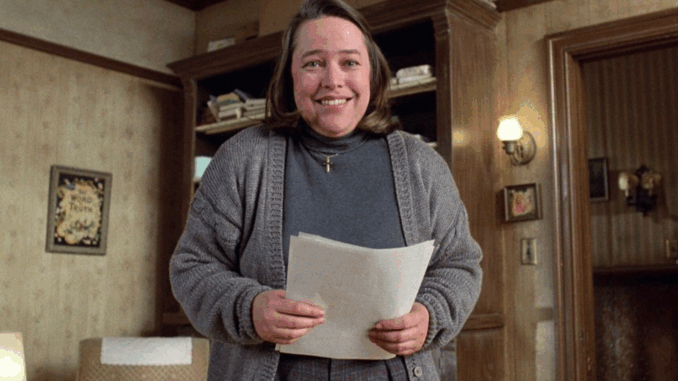
Early Life and the Seeds of Performance
Kathy Bates was born on June 28, 1948, in Memphis, Tennessee. The youngest of three daughters in a conservative Southern family, she grew up surrounded by the traditions and values of the American South—elements that would later shape some of her most iconic roles. Her mother, Bertye Kathleen, was a homemaker, while her father, Langdon Doyle Bates, was a mechanical engineer and a World War II veteran. From an early age, Kathy displayed a strong personality and a vivid imagination, traits that hinted at a future far beyond her Memphis upbringing.
She attended Southern Methodist University in Dallas, Texas, where she studied theater and honed her craft. It was there that she began to develop her bold, expressive acting style and unwavering dedication to character work. Bates graduated in 1969 with a degree in Fine Arts, determined to carve her path in the theater world despite industry challenges, especially for women who didn’t fit the Hollywood mold.
Struggles and Persistence in Early Career
After college, Bates moved to New York City in pursuit of stage work. She quickly realized that Broadway success didn’t come easily. She took on various small roles and worked odd jobs while continuing to audition and build a name for herself in the Off-Broadway scene. Her unglamorous appearance by Hollywood standards often made it difficult to land leading roles, but she never allowed typecasting to deter her ambitions.
During the 1970s and early 1980s, Bates made several appearances in television and theater, gradually becoming recognized as a powerful stage presence. Her performance in plays such as ‘night, Mother earned her respect in theatrical circles and would later help transition her into film.
Breakthrough and Critical Acclaim

Bates’s breakthrough came in 1990 with her chilling portrayal of Annie Wilkes in Misery, based on the Stephen King novel. The role was a psychological tour de force, combining vulnerability and menace in equal measure. Bates won the Academy Award for Best Actress, and the film catapulted her to international fame.
It was a defining moment—not only for her career but for the portrayal of complex female characters in cinema. Bates had proven that actresses didn’t need to conform to beauty standards to lead box office hits. Her Annie Wilkes remains one of the most memorable villains in cinematic history.
Following this success, Bates continued to land roles that highlighted her range. She portrayed unsinkable characters in Fried Green Tomatoes (1991), Dolores Claiborne (1995), and Titanic (1997), each performance further cementing her status as a leading woman in Hollywood.
Evelyn Couch and the Power of Change
In Fried Green Tomatoes, Bates portrayed Evelyn Couch, a timid, overlooked housewife undergoing a radical personal transformation. The role struck a chord with millions of viewers who saw in Evelyn a reflection of their own struggles with identity, confidence, and societal expectations.
Through Evelyn’s journey—sparked by her friendship with the elderly Ninny Threadgoode—Bates showcased her ability to balance comedy and drama with grace and authenticity. Her now-iconic “Tawanda!” scene became a cultural moment, celebrated for its humor and the underlying message of female empowerment.
Her work in this film exemplified her gift for breathing real, flawed humanity into every character she plays. Evelyn’s transformation from meek to bold was more than narrative arc—it was a metaphor for the strength lying dormant in so many.
Later Work and Continued Excellence
Kathy Bates has remained a prolific and respected actress for over five decades. After her Oscar win, she received further Academy Award nominations for her roles in Primary Colors (1998) and About Schmidt (2002). She earned numerous Emmy nominations and wins, particularly for her appearances in shows like American Horror Story and Two and a Half Men.
She also tried her hand at directing, both in television and on the stage. Her ability to lead both in front of and behind the camera reinforced her creative versatility.
Bates’s resilience as a performer mirrors the strength of her most beloved characters. Even in later years, she consistently challenges herself with diverse roles, never shying away from complexity or darkness.
Personal Life and Advocacy
In 2003, Bates was diagnosed with ovarian cancer, a battle she fought privately for nearly a decade. Then in 2012, she revealed she had undergone a double mastectomy after being diagnosed with breast cancer. Her candor about her health journey and her struggle with lymphedema—an often overlooked condition—helped raise awareness and support for others facing similar diagnoses.
She has since become an outspoken advocate for cancer research, women’s health, and body positivity. Her work with organizations like Lymphatic Education & Research Network demonstrates her commitment to using her platform for good.
Despite the personal hardships, Bates has remained active, continuing to deliver critically acclaimed performances while inspiring others with her unbreakable spirit.
Legacy and Impact
Kathy Bates’s legacy is one of talent, perseverance, and transformation. She defied industry norms and carved out a path on her own terms. With her unique blend of emotional depth, humor, and fearless strength, she has influenced a generation of actresses and audiences alike.
In Fried Green Tomatoes, as in her other work, she captured the quiet desperation and latent power of women pushed to the margins—and then showed them roaring back into the center of their own stories.
More than three decades since Evelyn Couch shouted “Tawanda!”, the name Kathy Bates continues to stand for integrity, excellence, and the boldness to be unapologetically oneself.
